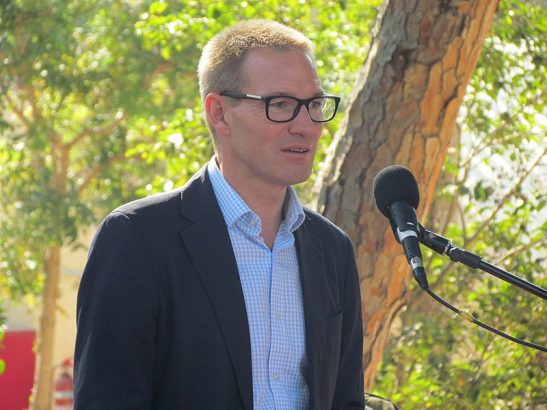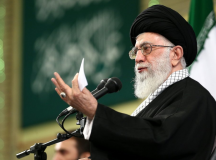BICOM’s Director Richard Pater spoke to UK Ambassador Neil Wigan shortly before the turn of the year about the UK-Israel relationship after Brexit, the Iran nuclear deal after Trump, and the Peace Process after the Abraham Accords. The interview launches a series of articles and interviews that will run in Fathom throughout 2021 examining the past, present and future of the UK-Israel relationship.
The UK-Israel Relationship Today
I was last in Israel between 2002-6 during the Second Intifada. There were regular suicide bombings in Israel and the IDF had returned to the occupied territories under Operation Defensive Shield. The sense of conflict and personal security were very acute. I used to get the bus to work and I felt the tension; every time you entered a café, restaurant or cinema you were searched. Coming back to Israel now I notice a big change. The conflict feels a lot more distant than it used to, which is clearly a positive. We’ve also seen 15 years of strong economic growth in Israel and the country feels a lot richer now than before. GDP per capita is about the same as the UK at the moment. And linked to that, we’ve seen an amazing growth in the technology sector, which was underway when I was last here, but the impact is now seen in all aspects of Israeli life, from how Israel engages with the world to how the international community sees Israel. Part of the reason behind the normalisation process is the growing sense in the Arab world that there are great opportunities to be had by engaging with Israel and Israeli technology.
When I was first here the embassy was very much focused on the Israeli-Palestinian conflict and the peace process. That is no longer the case. We now spend a lot more time on Iran and regional issues. Also, the UK-Israel military relationship has grown out of all recognition. We recently signed a new defence agreement with Israel. I got to see a UK fighter land in Ramat David airbase for the first time since it was an RAF base pre-independence. Our trade relationship has expanded greatly – we are now Israel’s third biggest trading partner after the US and China – we are seeing a steep rise in collaboration between different governmental departments and in the private sector in technology, and increasingly in Science, where I think the UK and Israel could do a lot more together.
On Brexit
Brexit will not have a huge impact on the bilateral relationship. Israelis see the UK more as an independent state than an European one. Indeed, some Israeli leaders have welcomed Brexit and seen it as an opportunity, and in the UK some politicians see Israel as a case study to show how Brexit can help expand the UK’s relationships globally. Israel was one of the first countries which signed a trade continuity accord with the UK.
Trade between Israel and UK fell roughly in line with how both country’s trade fell globally due to COVID-19 in the last year – about 10 per cent. This comes on the back of some strong growth in the last several years to over £10bn per year. I am confident that will we get back to that level quickly, particularly because technology, which is driving trade between us, has been less affected than other sectors by COVID-19. More people are looking to move into data and tech post-COVID than before, so in many ways the pandemic has increased the opportunities for both sides to expand the relationship.
Our values will not change after Brexit. We are very clear that we’re leaving the EU, not Europe and there will be some issues, like Iran, where we will continue to work very closely with our EU allies. But the UK government believes that leaving the EU will allow us to move more quickly to enact policies. For example, we will be able to put in place our own national sanctions regime rather than being part of a broader EU sanctions policy that relies on building a consensus. But I wouldn’t expect a massive change as our interests and values will remain the same.
Iran and the JCPOA nuclear deal
We agree entirely with Israel on the objective, which is to halt Iranian plans to build nuclear weapons, ballistic missiles and to stop its malign activity in the region, but we disagree on the means, particularly as regards the JCPOA nuclear deal. We discuss our concerns frankly and openly with Israel. We absolutely understand Israeli concerns, and whilst we do not claim the nuclear deal is perfect, we do believe it was the best deal to be negotiated at the time. We also think that it helped to constrain and monitor Iran’s nuclear programme, which benefits everyone. We are now entering a new and different phase with the arrival of the new US administration and we have to wait and see where that will lead us. We hear very clearly, not only from Israel but Gulf countries as well, that the region as a whole must be listened to as we get into the next phase with Iran.
The British embassy is doing a lot of the direct conversation with Israel (given the concerns of travel during COVID). Our colleagues at the UN in New York and at the IAEA in Vienna are also maintaining a constant dialogue with the Israelis because this is at the top of their agenda. We speak not only about the nuclear programme but also with other concerns Israelis have about Iran, including its regional activity, which Israelis tell us has actually increased in recent years, particularly in Syria, including the delivery of precision-guided missiles to Hezbollah. We share those concerns and we have our own concerns about what Iran is doing, which is directly against UK interests, particularly in Iraq, Syria and Yemen.
The Iranian challenge requires a global effort. There will be different strategies in different countries. Israeli clearly acts directly against Iran in Syria in a way the British government would not involve itself with, but it is something we talk about to Israel constantly.
On President-Elect Biden
We’ve welcomed President-Elect Biden’s early statements on the JCPOA and on getting back to the diplomatic process. This includes getting Iran back into compliance with the agreement. The British, French and German foreign ministers recently issued a joint statement expressing its concern over the Iranian violations of the JCPOA and the new law that would increase Iran’s enrichment activity and we’ve called on Iran to come back into compliance.
It is critical for Iran to do so, given the position of the incoming Biden administration. It was something Iran judged was in their interests when they signed the deal back in 2015. We’ve seen US sanctions have a real impact on the Iranian economy, so now Iran has a clear strategic opportunity to return to compliance on its nuclear programme and to improve its relationships with neighbours and international partners, if it wants to get its economy back into a stable place.
The UK has is its diplomatic footprint across the region and that is a big advantage. For example we have an embassy in Tehran which the US and Israel does not. So, we have a depth on engagement with all countries in the region and we participate in a range of active programmes such as security-sector reforms in Lebanon and Iraq, and that makes us a major soft power in the region and the Israelis are extremely interested in hearing what we have to say.
Restarting the Peace Process?
We’ve got close and positive relationship with both sides, and that is not something many countries can still say. The Israeli-Palestinian conflict still attracts a lot of interest in the UK. Foreign Secretary Raab was in Israel in July, shortly after the Abraham Accords were announced, and he encouraged both sides to build on the momentum of the normalisation process. We are hopeful that the return of collaboration between the two sides since then will lead into a path toward negotiations. Clearly that needs to be led by the sides but the UK will do all it can to support it.
With the Palestinian people, we have increased our programme with UNRWA since the US withdrew its funding from the UN body. We also give funding directly to the PA which helps it provide social and health services to its people, we also provide technical assistance and security sector reform, the latter of which has greatly improved the Palestinians’ ability to withstand shocks, including the recent breakdown of cooperation with Israel over the issue of annexation. The fact that the breakdown of security cooperation didn’t lead to increased instability in the West Bank is a real positive, and proof that the work we invested has made a difference.
On the Abraham Accords
The British government was one of the very first to come out and welcome the signing of the Abraham Accords and the agreement with Sudan. We think the agreements are good for Israel, the Arab states and for the region as a whole. We will look to support them wherever we can. We also hope the agreements will restart negotiations between Israel and the Palestinians.
A lot of interesting collaboration is already happening since the signing of the accords and I’ve been really struck by how quickly the Israelis and Emirates were able to move forward on a really wide range of issues. I have Israelis telling me that the Emirates are moving faster than the Israeli system can cope – which is a good problem to have. The British government is looking to add value in the trilateral relationship, whether that is in science, technology or regional politics.







































There are no “occupied territories” in The Land of Israel.
The Land of Israel from the river to the sea is the Jewish National Home.
That was acknowledged by the 1922 Mandate that was given to the Britain that used to be Great once upon a time.
It is “surprising” (diplomatspeak) for a British represenatative of all people to utter such a canard.
correction: the only occupied territory in The Land of Israel is the Arab “Palestinian” Hamas-occupied Gaza Strip.
Think what you will about the Israeli interest in retaining control over the liberated territories, but do not misrepresent them as “occupied.”
That is fake “law” and fake history.